- Home
- Peter F. Hamilton
Neutronium Alchemist - Conflict nd-4 Page 2
Neutronium Alchemist - Conflict nd-4 Read online
Page 2
“Officer Mabaki works for the Dorados Immigration Service,” Sarha explained as she pulled up a chair.
“Excellent,” Joshua said. “I’d like to purchase some of your files.”
It cost him fifteen thousand fuseodollars to learn that the Samaku had definitely docked at Ayacucho. One passenger had disembarked.
“That’s her,” Mabaki confirmed after Joshua datavised a visual file to him. “Daphine Kigano. You don’t forget women like that.”
“Daphine Kigano, really? Bit of a viper was she?”
“You’re telling me.” Mabaki savoured another sip of the Tennessee Malt Joshua had bought him. “She was some friend or other of Ikela’s. You don’t mess with those sort of connections.”
Joshua datavised the club’s net processor for a civil information core, and accessed a file on Ikela. It was mostly public relations spin released by T’Opingtu, but it gave him an idea of what he was dealing with. “So I see,” he muttered. “Can you tell us what starships have left since Daphine Kigano arrived?”
“That’s simple. None. Well, not unless you count the Edenist delegation, but they’re from this system’s gas giant anyway. There are still some inter-orbit ships flying, but no Adamist starships. The Lady Macbeth is the first starship to arrive since the Samaku departed.”
After Mabaki left a grin spread over Joshua’s face. It was the first in a long time which didn’t have to be printed there by neural nanonics. “She’s still here,” he said to the others. “We’ve got her.”
“We’ve got a lead on her,” Melvyn cautioned. “That’s all.”
“Optimist. Now we know who to ask for, we can start focusing our efforts. I think this Ikela character would be a good place to start. Hell, we can even get a legitimate appointment. T’Opingtu is the kind of company we ought to approach for Tranquillity’s SD spares, anyway.” He drained his beer bottle and put it back on the table. A flash of movement caught his eye, and he slapped his hand down on the spider which was scuttling clear of the soggy mat.
“Oh, well,” Samuel said. “At least we know why he’s here. I suppose Ione Saldana must have commissioned him to track Mzu.”
“That stupid little cow,” Monica complained. “Doesn’t she have any idea what kind of issues she’s fooling with? And sending some bloody mercenary on the chase!”
“Lagrange Calvert,” Samuel mused. “I suppose she could have done worse. He’s certainly got the balls for a mission like this.”
“But not the style. God, if he starts blundering around asking questions everyone in the Dorados is going to know Mzu is running loose. Here of all places! I ought to terminate him; it’d save us a nasty headache in the long term.”
“I do wish you wouldn’t keep on about how much easier life would be if we killed everyone who poses the slightest inconvenience. Calvert is an amateur, he’s not going to bother us. Besides, he won’t be the one who stirs up the public.” Samuel indicated the row of AV pillars set up along one side of the rented office. Edenist agents were busy monitoring the output of every Ayacucho-based media company.
News of Ikela’s death was already breaking, tying it in with reports of a “disturbance” at the offices of Laxa and Ahmad. Police were treating the death as suspicious, refusing to comment to the rovers gathered outside the doors of the legal firm. Although they’d already let slip that they would like to question Kaliua Lamu about the death.
Monica winced at that. She shouldn’t have blown him, but they had been desperate for the information. The financier had demanded that Monica protect him from his erstwhile comrades: a request she could hardly refuse. He and his family were already on board one of the Edenist delegation’s voidhawks, waiting to be spirited away to safety. “Don’t I know it. That Cabral is going to make our life hell,” she grumbled. “I don’t know why you let him and the other two go.”
“You know perfectly well why. What else could we do? For goodness’ sake, Feira Ile is Ayacucho’s SD chief; and Malindi is president of the Merchant’s Association; and both of them sit on the Dorados governing council. I could hardly authorize their abduction.”
“I suppose not,” she sighed.
“It’s not as if they can tell people what they were doing, or even that they were there.”
“Don’t count on it. They’re certainly above the law here; and if any word of Mzu does leak out it’ll inflame the nationalist sympathy.”
“I think we had better assume it will do. Cabral will make sure of it. After all, he voted to help her retrieve the Alchemist.”
“Yes.” She let out an exasperated groan. “God, we walked right past her!”
“Ran past,” Samuel corrected.
Monica glared at him. “Any sightings?”
“None at all. However we are losing an unusual number of spiders.”
“Oh?”
“Children are going around killing them. It’s some kind of organized game. Several day clubs are running competitions to see who can find the most. There are cash prizes. Clever,” he acknowledged.
“Somebody’s well organized.”
“Yes and no. Children are a most peculiar method of attack, the numbers they can eliminate will inconvenience us rather than block us. If it was another agency that discovered we were infiltrating the asteroid, they would release a tailored virus to kill the spiders.” He cast an inquiring glance. “No?”
She puckered her lips in an ironic smile. “I would imagine that could well be standard operating procedure for some people.”
“So . . . it isn’t an agency, but it is someone who has connections that reach down into local day clubs. And quickly.”
“Not the partizans. They were never that well organized, and their membership is mostly aging reticents. The group that has Mzu?”
“By process of elimination, it must be.”
“Yes, but so far we only know one member, this Voi girl. If there is an inner core of partizans I find it hard to believe the ESA didn’t know about them.”
“And us.” He looked over to the agents monitoring the news, his face flickering through a range of expressions as he exchanged a barrage of questions and answers across the general affinity band. “Interesting.”
“What?” she asked patiently.
“Given Ikela’s mysterious death and his wealth, there’s been no mention of his daughter by any media company. That’s normally the first thing reporters focus on: who’s going to inherit.”
“Cabral’s shielding her.”
“Looks like it.”
“Do you think he could be involved with this new group?”
“Very unlikely. From what we know about him, his partizan involvement was minimal, he was part of it for form’s sake.”
“So what the hell group is Voi mixed up with?”
Much later, when he had the time to sit down and think about it, Liol gave Lalonde as the reason for being so slow off the mark. He would never have been so sluggish under normal circumstances. But after accessing Kelly Tirrel’s report he hit Ayacucho’s clubs and bars, drinking and stimming out with methodical determination. A lot of people were doing exactly the same thing, but for a different reason. They merely feared the possessed, while Liol had watched his life’s dream crumple in less than a second.
It had always been a dangerous dream. A single hope which has lasted from the earliest days of childhood is not a sound foundation on which to build a life. But Liol had done it. His mother had always told him his father would come back one day; an assurance she kept on repeating through another three husbands and countless boyfriends. He will return, and he’ll take us away with him; somewhere where the sun shines dazzling white and the land is flat and endless. A universe away from the Dorados, worldlets haunted by the momentous horror and tragedy of the past.
The dream—the sure knowledge—of his destiny gave Liol attitude, setting him apart from his peers. His was among the first generation of Garissans born after the genocide. While others suffered from their parents
’ nightmares, a young Liol flourished in the expanding caverns and corridors of Mapire. He was the champion of his day club; idolized as reckless by his teeny friends, the first of all of them to get drunk, the first to have sex, the first to try soft drugs, and then not so soft, the first to run a black stimulant program through newly implanted neural nanonics. A genuine been-there-done-that kid, as much as you could go and do within the limited scope for experience permitted in orbit around Tunja.
His zest even carried over into his early twenties, when the years of his father’s non-return were beginning to pile up in an alarming quantity. He still clung to his mother’s promise.
A goodly number of his contemporaries emigrated from the Dorados when they reached their majority, a migration worrying to the council. Everyone assumed Liol would be among them, surely the first who would want to seek new opportunities. But he stayed, joining in the effort to build the Dorados into a prime industrial state.
Garissa’s refugees had been awarded the settlement rights to the Dorados by the Confederation Assembly as part of their restitutions against Omuta for the genocide. Every multistellar company mining the ore had to pay a licence fee to the council, part of which was used to invest in the asteroids’ infrastructure, while the remainder was paid directly to the survivors, and their descendants, by now scattered across the Confederation.
By 2606 this dividend had grown to a respectable twenty-eight thousand fuseodollars per annum. With such a guaranteed income as collateral, Liol had little trouble collecting loans and grants from the bank and the Dorados Development Agency to start his own business. In keeping with his now somewhat unhealthy obsession with spaceflight, he formed a company, Quantum Serendipity, specializing in servicing starship electronics. It was a good choice; the number of starship movements in the Tunja system was growing each year. He was awarded subcontracts by the larger service and maintenance companies, working his way up the list of approved suppliers. After two years of steady growth, he leased a docking bay in the spaceport, and made his first bid for a complete starship maintenance service. Year three saw Quantum Serendipity buy a majority share in a small electronics station; by producing the processors in-house he could undercut his competitors and still make a profit.
He now had the majority shares in two electronics stations, owned seven docking bays, and employed seventy people. And six months ago, Quantum Serendipity had landed a service contract for the communications network linking Ayacucho’s SD platforms; a rock-solid income which was on the verge of pushing him into a whole new level of operations.
Then news of the possession arrived from the Confederation Assembly, swiftly followed by Kelly Tirrel’s report. The first didn’t bother Liol half as much as his competitors, with his SD contract he could keep his company afloat throughout the crisis. But the second item, with its hero-of-the-day, super-pilot Lagrange Calvert rescuing little kiddies in his starship. That came close to breaking Liol. It was the end of his world.
None of his friends understood the reason behind his sudden ferocious depression, the worrying benders he launched himself into. But then they had never been told of his dream, and how much it meant to him, that was private. So after a couple of abortive attempts to “cheer him up” had failed dismally amid his tirades of calculatingly vicious abuse, they had left him alone.
Which was why he’d been surprised when the girl in the Bar KF-T had spoken to him. Surprised, and not a little bit blasted. The come-on routine he gave her was automatic, he didn’t have to think. It was only when she’d gone that a frown crossed his flattish, handsome face. “Joshua,” he said in a drink-fuddled voice. “She called me Joshua. Why did she do that?”
The barmaid, who by now had given up on the idea of lugging him home for the night, shrugged gamely and moved on.
Liol drained his whisky chaser in one swift toss, then datavised a search request into the spaceport registration computer. The answer seemed to trojan a wickedly effective sober-up program into his neural nanonics.
Alkad had seen worse rooms when she was on the move thirty years ago. The hotel charged by the hour, catering for starship crews on fast stopovers, and citizens who wanted somewhere quiet and private to indulge any of a variety of vices which modern technology could provide. There was no window, the hotel was cut into rock some distance behind the cliff at the end of the biosphere cavern. It was cheaper that way. The customers never even noticed.
Big holograms covered two of the walls, showing pictures of some planetary city at dusk, its jewelscape of twinkling lights retreating into a horizon of salmon-pink sky. The bed filled half of the floor space, leaving just enough room for people to shuffle around it. There was no other furniture. The bathroom was a utilitarian cubicle fitted with a shower and a toilet. Soaps and gels were available from a pay dispenser.
“This is Lodi Shalasha,” Voi said when they arrived. “Our electronics supremo, he’s made sure the room’s clean. I hope. For his sake.”
The young man rolled off the bed and smiled nervously at Alkad. He was dressed in a flamboyant orange suit with eye-twisting green spirals. Not quite as tall as Voi, and several kilos overweight.
Student type, Alkad categorized instantly, burning with the outrage that came from a head stuffed full of fresh knowledge. She’d seen it a thousand times before when she was a lecturer; kids from an easy background expanding their minds in all the wrong directions at the first taste of intellectual freedom.
His smile was strained when he looked at Voi. “Have you heard?”
“Heard what?” the tall girl was immediately suspicious.
“I’m sorry, Voi. Really.”
“What?”
“Your father. There was some kind of trouble at the Laxa and Ahmad offices. He’s dead. It’s all over the news.”
Every muscle in the girl’s body hardened, she stared right through Lodi. “How?”
“The police say he was shot. They want to question Kaliua Lamu.”
“That’s stupid, why would Kaliua shoot my father?”
Lodi shrugged hopelessly.
“It must have been those people running to the offices. Foreign agents, they did it,” Voi said. “We must not let this distract us.” She paused for a moment, then burst into tears.
Alkad had guessed it was coming, the girl was far too rigid. She sat Voi down on the bed and put her arm around the girl’s shoulders. “It’s all right,” she soothed. “Just let it happen.”
“No.” Voi was rocking back and forth. “I must not. Nothing must interfere with the cause. I’ve got a suppressor program I can use. Give me a moment.”
“Don’t,” Alkad warned. “That’s the worst thing you can do. Believe me, I’ve had enough experience of grief to know what works.”
“I didn’t like my father,” Voi wailed. “I told him I hated him. I hated what he did. He was weak.”
“No, Ikela was never weak. Don’t think that of your father. He was one of the best navy captains we had.”
Voi wiped a hand across her face, simply broadening the tear trails. “A navy captain?”
“That’s right. He commanded a frigate during the war. That’s how I knew him.”
“Daddy fought in the war?”
“Yes. And after.”
“I don’t understand. He never said.”
“He wasn’t supposed to. He was under orders, and he obeyed them right up to his death. An officer to the last. I’m proud of him. All Garissans can be proud of him.” Alkad hoped the hypocrisy wouldn’t taint her voice. She was alarmingly aware how much she needed Voi’s people now, whoever they were. And Ikela had almost kept the faith, it was only a white lie.
“What did he do in the navy?” Voi was suddenly desperate for details.
“Later, I promise,” Mzu said. “Right now I want you to activate a somnolence program. Believe me, it’s the best thing. We were having a hard enough day before this.”
“I don’t want to sleep.”
“I know. But you need it.
And I’m not going anywhere. I’ll be here when you wake up.”
Voi glanced uncertainly at Lodi, who nodded encouragingly. “All right.” She lay back on the bed, shuffled herself comfortable, and closed her eyes. The program took hold.
Alkad stood up and deactivated the chameleon suit. It was painful peeling the hood off her face, the thin fabric stuck possessively to her skin. But the room’s cool air was a tonic; she’d sweated heavily underneath it.
She split the seal on her blouse and began to wriggle her arms out of the suit.
Lodi coughed frantically.
“Never seen a naked woman before?”
“Er, yes. But . . . I. That is—”
“Are you just playing at this, Lodi?”
“Playing at what?”
“Being a good-guy radical, a revolutionary on the run?”
“No!”
“Good. Because you’re going to see a lot worse than a bare-arsed woman my age before we’re done.”
His skittish attitude calmed. “I understand. I really do. Er—”
Alkad started on the trousers, they were tighter than the hood. “Yes?”
“Who are you, exactly?”
“Voi didn’t explain?”
“No. She just told me to alert the group for possible action. She said we must be careful because the asteroid was probably under covert surveillance.”
“She was right.”
“Yeah, I know,” he said proudly. “I was the one who worked out the Edenists were spreading those spiders.”
“Clever of you.”
“Thanks. Our junior cadres are cleaning them from critical areas, corridor junctions and places. But I made sure they skimp around this hotel; I didn’t want to draw attention to it.”
“A smart precaution. So do these cadres of yours know we’re here?”
“No, absolutely not; nobody else knows. I swear. Voi said she wanted a safe room; I even paid cash.”
Maybe I can still salvage this after all, Alkad thought. “Tell you what, Lodi; I’m going to have a shower first, then afterwards you can tell me all about this little group of yours.”

 A Night Without Stars
A Night Without Stars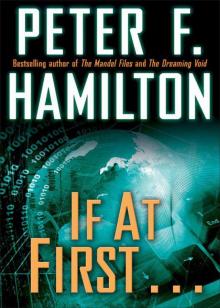 If at First . . .
If at First . . .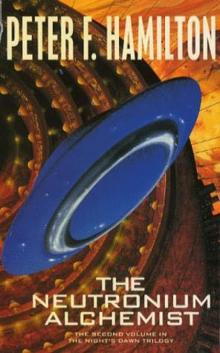 The Neutronium Alchemist
The Neutronium Alchemist Great North Road
Great North Road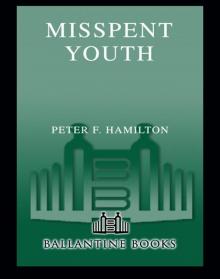 Misspent Youth
Misspent Youth Pandora's Star
Pandora's Star The Evolutionary Void
The Evolutionary Void The Dreaming Void
The Dreaming Void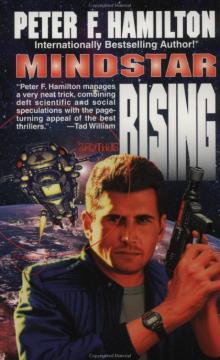 Mindstar Rising
Mindstar Rising The Temporal Void
The Temporal Void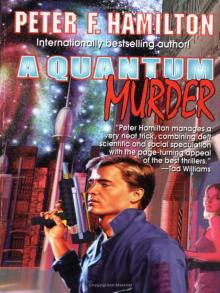 A Quantum Murder
A Quantum Murder The Hunting of the Princes
The Hunting of the Princes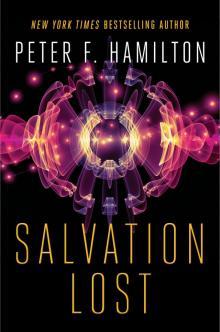 Salvation Lost
Salvation Lost The Dreaming
The Dreaming Salvation
Salvation Light Chaser
Light Chaser The Mandel Files, Volume 2: The Nano Flower
The Mandel Files, Volume 2: The Nano Flower![The Saints of Salvation [British Ed.] Read online](http://i1.bookreadfree.com/22/the_saints_of_salvation_british_ed__preview.jpg) The Saints of Salvation [British Ed.]
The Saints of Salvation [British Ed.] Manhattan in Reverse
Manhattan in Reverse The Secret Throne
The Secret Throne A Window Into Time
A Window Into Time A Second Chance at Eden
A Second Chance at Eden The Nano Flower
The Nano Flower The Confederation Handbook
The Confederation Handbook The Naked God
The Naked God The Saints of Salvation
The Saints of Salvation The Void Trilogy 3-Book Bundle
The Void Trilogy 3-Book Bundle The Abyss Beyond Dreams
The Abyss Beyond Dreams A Voyage Through Air
A Voyage Through Air Judas Unchained
Judas Unchained The Commonwealth Saga 2-Book Bundle
The Commonwealth Saga 2-Book Bundle The Naked God - Flight nd-5
The Naked God - Flight nd-5 Night Without Stars (Chronicle of the Fallers Book 2)
Night Without Stars (Chronicle of the Fallers Book 2) Neutronium Alchemist - Conflict nd-4
Neutronium Alchemist - Conflict nd-4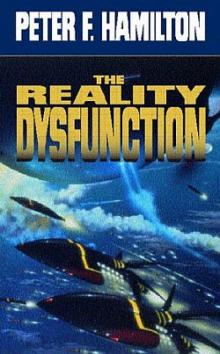 Reality Dysfunction - Expansion nd-2
Reality Dysfunction - Expansion nd-2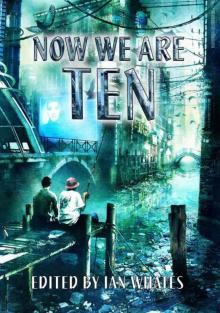 Now We Are Ten: Celebrating the First Ten Years of NewCon Press
Now We Are Ten: Celebrating the First Ten Years of NewCon Press Neutronium Alchemist - Consolidation nd-3
Neutronium Alchemist - Consolidation nd-3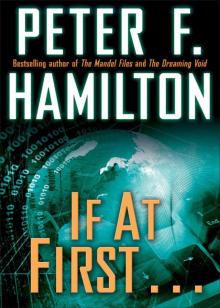 If at First . . . (Short Story)
If at First . . . (Short Story) A Second Chance at Eden nd-7
A Second Chance at Eden nd-7 Judas Unchained cs-2
Judas Unchained cs-2 The Mandel Files, Volume 1
The Mandel Files, Volume 1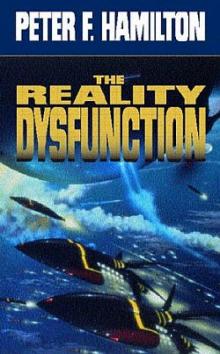 Reality Dysfunction — Emergence nd-1
Reality Dysfunction — Emergence nd-1 The Temporal Void (ARC)
The Temporal Void (ARC) The Mandel Files
The Mandel Files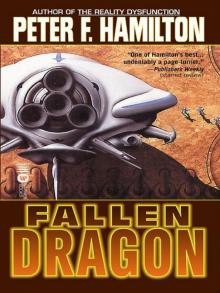 Fallen Fragon
Fallen Fragon Misspent Youth (commonwealth saga)
Misspent Youth (commonwealth saga)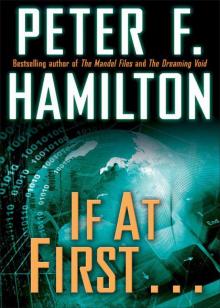 If at First...
If at First... Best of British Science Fiction 2016
Best of British Science Fiction 2016 The Mandel Files, Volume 2
The Mandel Files, Volume 2 The Naked God - Faith nd-6
The Naked God - Faith nd-6 The Night's Dawn Trilogy
The Night's Dawn Trilogy Pandora's Star cs-2
Pandora's Star cs-2 A Window into Time (Novella)
A Window into Time (Novella)